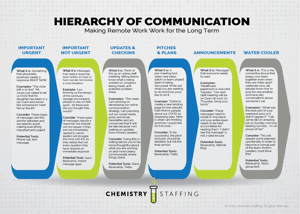Making remote work work for the long term
We are eight(ish) weeks into churches learning how to work remotely and for some, the excitement that was initially there has turned to angst. A few weeks ago, during our first Now What webinar, we said that remote working will expose just how healthy your organization is and how well you communicate as a team. Many churches are experiencing this right now.
As I survey the current church landscape, I'm fairly convinced that churches will be working remotely (either fully or partially) for the better part of the summer and into the fall (and potentially beyond), so we need to learn how to do this well. As we spend time with churches, the most common struggles that I have seen is how they deal with the asynchronous nature of remote work and communication.
Asynchrony
One of the greatest advantages of remote working is that it allows your team to work asynchronously. One of the greatest frustrations is that it allows your team to work asynchronously. By freeing our team from set work hours, many churches are finding that their team is scheduling their day around times that they are more naturally creative and productive. One pastor I know has begun to write sermons 4:00 am because this is when he is most able to focus and his mind is sharper. Another pastor I know is doing it at 8:00 pm for the same reason.
It shouldn't be a surprise that people have different working rhythms... we all know morning people and night people. The beauty of asynchronous work is that we are freeing our team to align their work rhythms with the way they are naturally wired. Where teams get into trouble is when you have people with different wirings working together, and becoming frustrated that not everyone is working the same way. The leaders of remote teams who manage this tension well, display three characteristics:
- Trust: There is an implicit trust of the team to follow through and do what is expected of them even when they are working at different times. If you do not trust your team to do the work, your issue is not remote working, it is organizational culture.
- Grace: Working remotely requires a level of grace that is not required in an office setting. Knowing that our team is not all in one place, at the same time, means that we need to give up on the idea that we are totally in control of what our team does and when they do it.
- Accountability: The hardest part of leadership is holding people accountable. This is true in an office environment and even more so when you are remote. Organizations that do not hold teams accountable create frustration, resentment, and misery. Great leaders will do the hard work of holding their team accountable to expectations and will lead the way by holding themselves accountable to standards. As hard as it can be to have accountability conversations, not having them is ultimately much worse.
The key to thriving in a remote working environment is managing your communication well. Churches that are communicating through text messages, Slack, email, google docs, tweets, and instant messages all at the same time will drop balls and drive each other crazy. As I am coaching churches on working remotely, I encourage them to develop a communication plan and determine how they will communicate what. I call this the Hierarchy of Communication (DOWNLOAD HERE):

- Important/Urgent: This is something that absolutely needs a response RIGHT NOW. Think: "The choir loft is on fire!" At Chemistry, we use the phone and text messages to communicate these kinds of messages. Important Note: these types of messages are few and far between.
- Important/Not Urgent: These are messages that need a response soon (within an hour or two), but do not involve a crisis situation. Think: "I am finishing up the design of the sanctuary signage encouraging people to stay six feet apart... do these look like you thought they would?" These types of messages require a response, but disaster will not happen if they are not immediately replied to. Important Note: these types of messages are the hardest for senior leaders to adjust to. We need to be ok with the fact that it is not practical for people in an asynchronous work environment to respond to everything instantaneously.
- Updates and Check-Ins: Think of these as an online staff meeting. These types of communications are to let teams know what we are working on, what kind of progress we are making, and where we are struggling. I've found that doing this in writing allows me to be more thoughtful about what I am working on and more clearly communicate where things stand. For team leaders, this can replace the staff meeting where everyone goes around the room for 90 minutes talking about what they are up to. Instead, teams can read through a post, interact, and move on.
- Pitches and Plans: These are instrumental for better meetings in a remote environment. Before a team meeting where a new idea (pitch) is to be discussed, we work to write out our thoughts in a way that describes what we are wanting to do. This allows people to interact with it beforehand and come to a meeting prepared to discuss it more fully... making your meetings more productive. We do the same with teams when we are working through our plans for an upcoming project.
- Announcements: This is where messages that everyone needs to read reside. Think: "Healthcare paperwork is due next Tuesday" or "our next staff meeting will be on Zoom at noon on Thursday, bring your lunch." These messages reside in one place, where they are easy to find.
- Water-cooler: Water-cooler conversations are the casual banter that allows your team to develop better relationships. This is where you celebrate wins, let people know how to pray for one another, and where you have silly conversations about someone's cat.
With the exception of urgent/Important messages, Chemistry uses Basecamp to manage all of our communication. This allows it to be in one place, organized in a way that makes sense, and easy to find. We rarely use email or text messages to communicate internally, and this change has made our lives much simpler and less frustrating. While Basecamp works great for us, there are plenty of platforms out there to communicate through... we strongly suggest you choose which platforms work best for your hierarchy of communications and commit to it.
My sense is that remote work will become far more accepted by churches in the season to come, and will allow churches to do things that were impossible only a few years ago... including adding teammates from across the country. As you continue to adapt and learn to work remotely, I'd love to help you think through your strategy. This link will help us find some time to talk.
My sense is that remote work will become far more accepted by churches in the season to come, and will allow churches to do things that were impossible only a few years ago... including adding teammates from across the country. As you continue to adapt and learn to work remotely, I'd love to help you think through your strategy. This link will help us find some time to talk.

PS. It's not too late to sign up for tomorrow's Now What? Webinar. Tod Bolsinger, author of Canoeing the Mountains, and Dave Travis will be joining us to discuss how the pandemic will change the way the church operates in the future. This will be a great conversation... click here to register!







